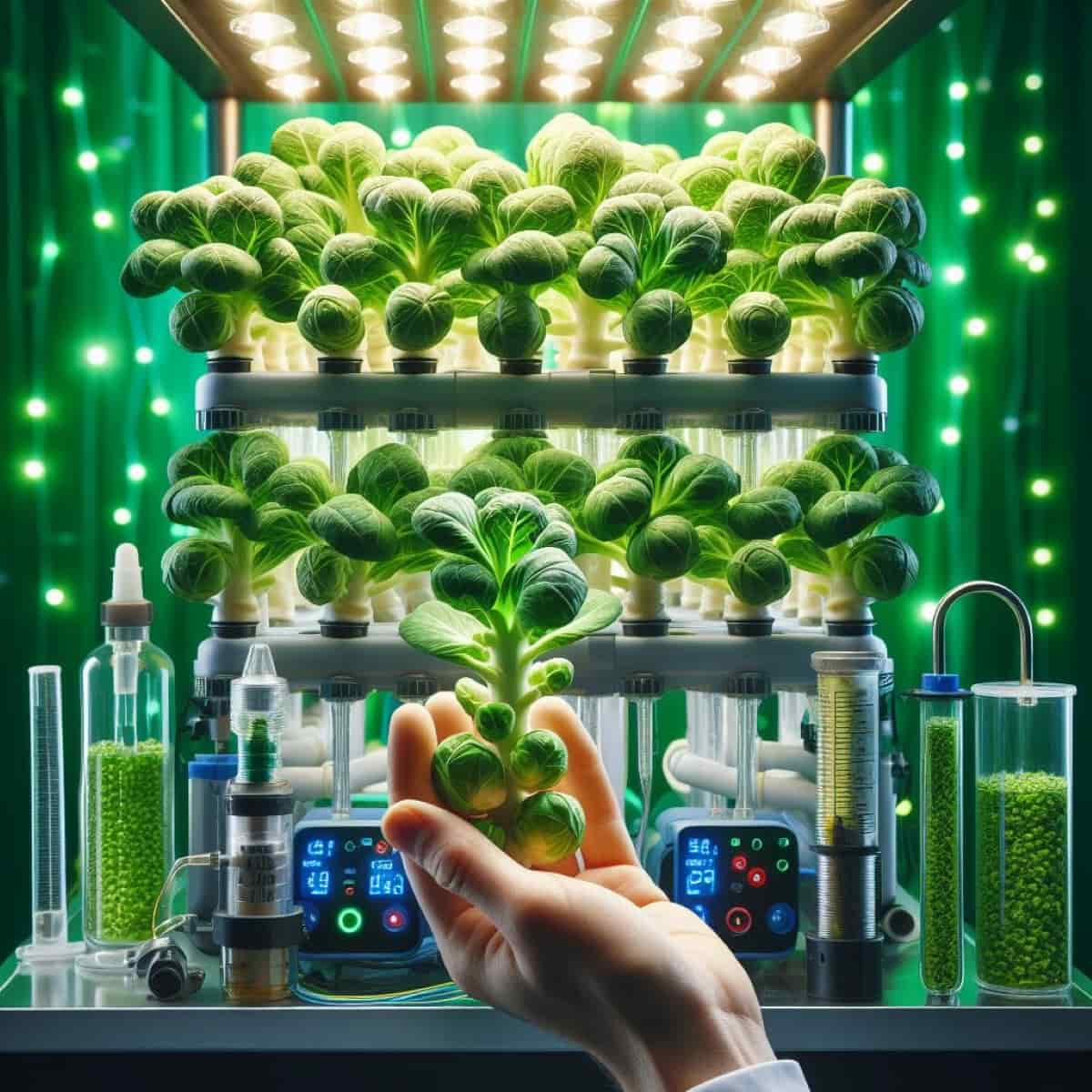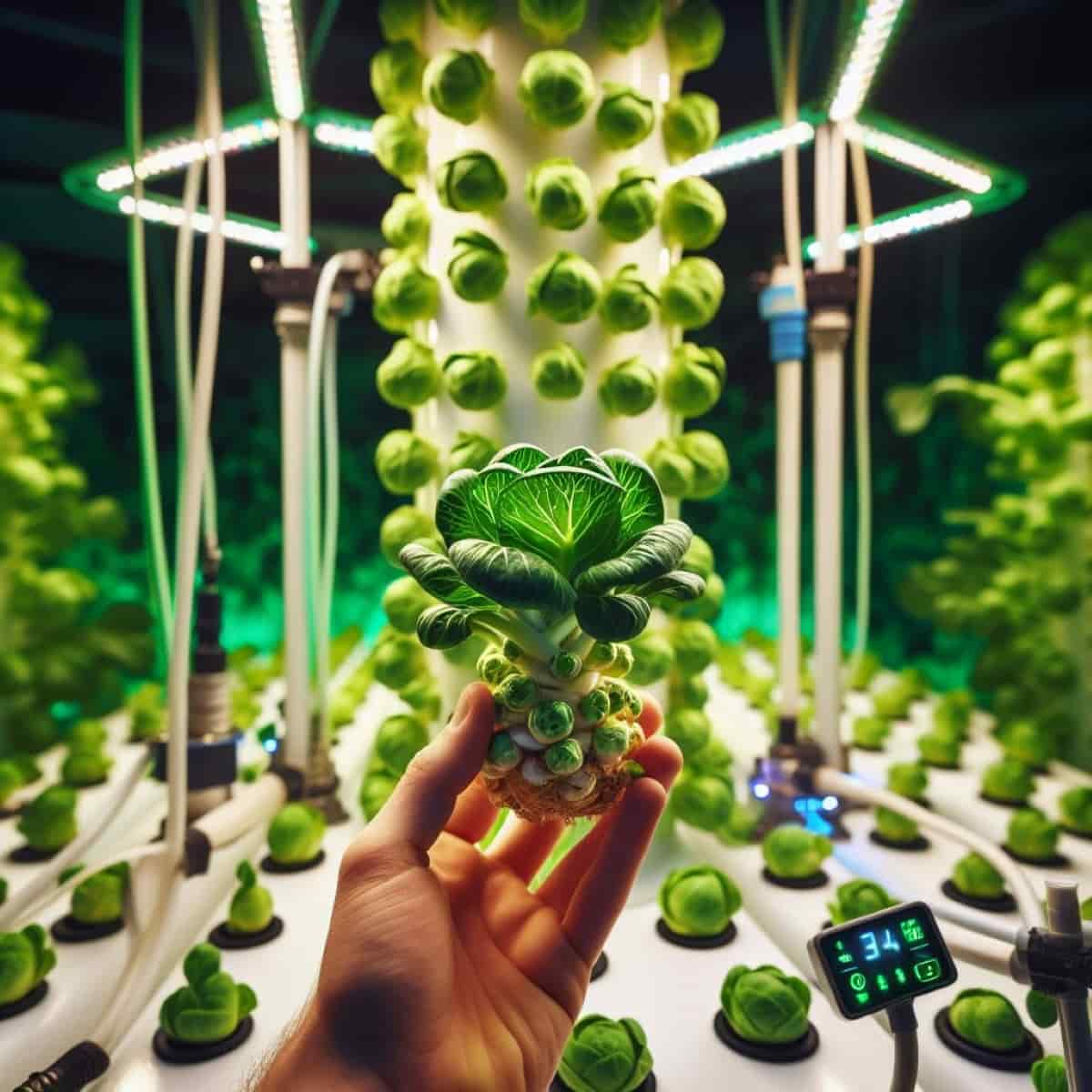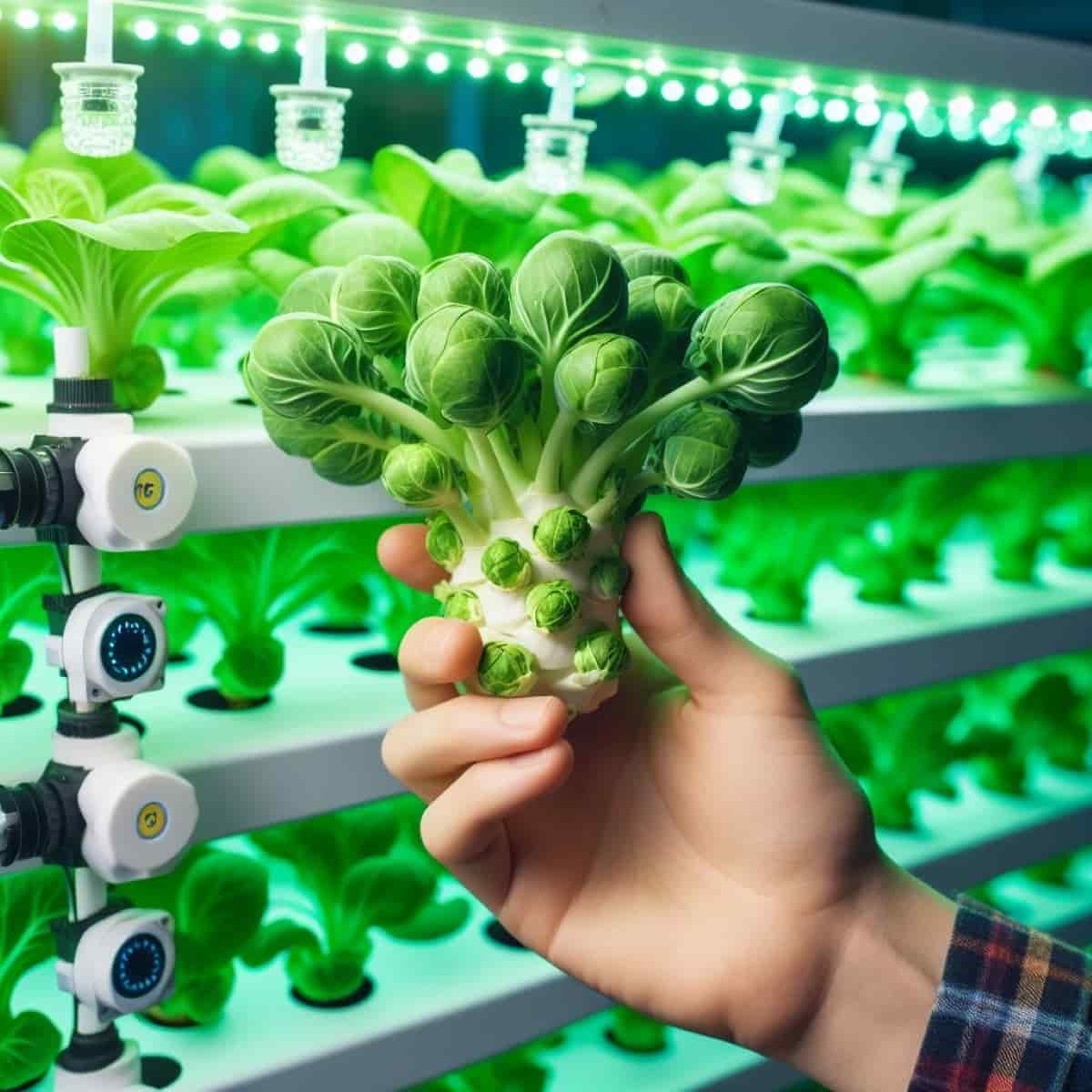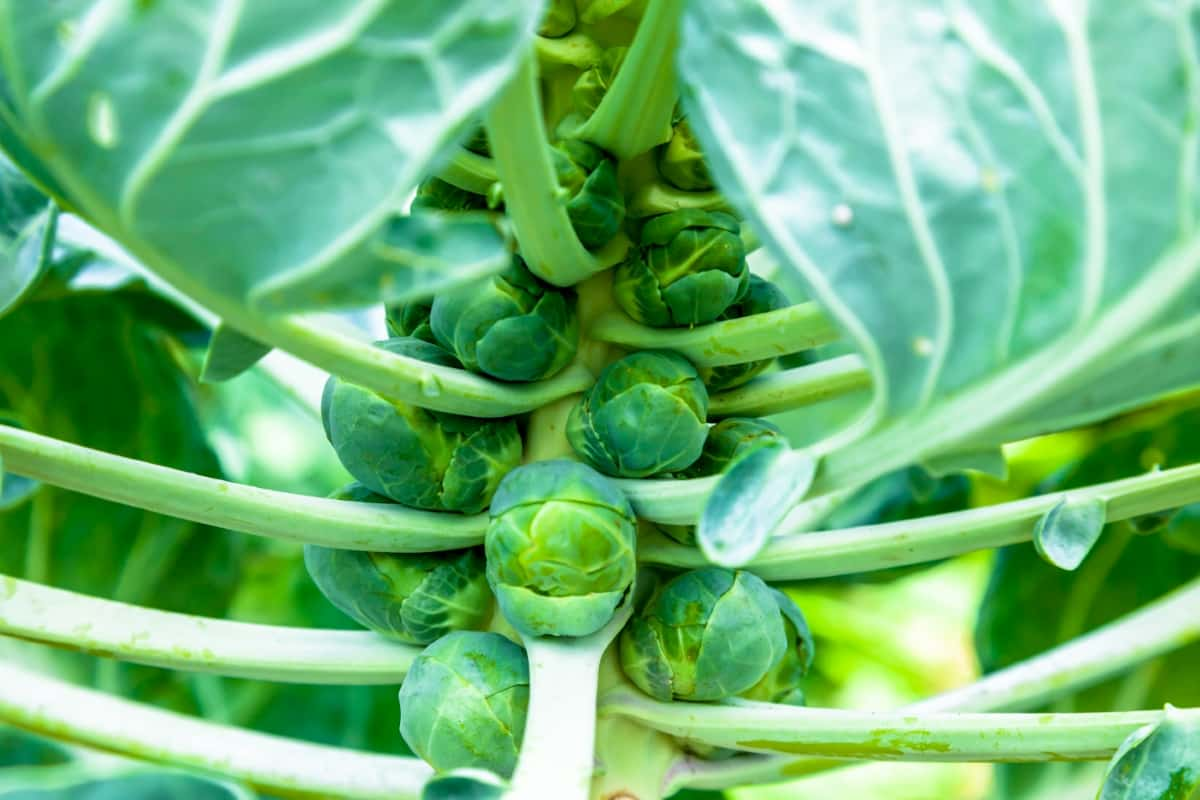Hydroponic systems have revolutionized how we grow vegetables, including Brussels sprouts, by allowing for soil-less cultivation with precise nutrient and water control. This advanced method is particularly effective for plants like Brussels sprouts and hydroponic broccoli, which thrive under controlled conditions. Due to its space-saving and efficient design, growing Brussels sprouts in a tower garden is a popular choice for hydroponic enthusiasts.

This system allows for higher yields and faster growth than traditional farming methods. Farmers and gardeners can produce healthy, robust plants with minimal environmental impact by understanding the essentials of hydroponic systems for Brussels sprouts. The hydroponic approach also addresses common soil-borne diseases and pests, offering a cleaner and more sustainable growing environment for these nutritious vegetables.
Hydroponic Brussels Sprouts
Right Varieties for Hydroponic Brussels Sprouts
Regarding hydroponic cultivation, selecting the right variety of Brussels sprouts is crucial for successful growth and yield. Not all varieties are suitable for hydroponic systems, and choosing those that can adapt well to this growing method is essential. For hydroponic Brussels sprouts cultivation, consider these varieties. Each variety brings unique characteristics, ensuring a diverse and successful hydroponic garden.
- Jade Cross, known for its high yield and disease resistance
- Long Island Improved, adaptable with a traditional flavor
- Redarling, offering reddish-purple, antioxidant-rich sprouts
- Churchill, fast-growing with robust flavor.
Ideal varieties for hydroponic systems are compact and have a strong root system, allowing them to thrive in the confined spaces of hydroponic setups. These varieties often mature faster and are more resilient to the fluctuations in nutrients and water that can occur in hydroponic systems. It’s also important to consider the flavor and size of the Brussels sprouts, as these factors can vary significantly between different varieties.
Optimal Environmental Conditions for Hydroponic Brussels Sprouts
Creating optimal environmental conditions is key to growing Brussels sprouts hydroponically. These plants require a balance of light, temperature, humidity, and air circulation to flourish. The best temperature for Brussels sprouts is 60 to 70 degrees Fahrenheit, and it’s better if it’s a bit cooler at night. Adequate natural lighting, supplemented with grow lights, is necessary for healthy growth and development.
A consistent light schedule of 14 to 16 hours per day is recommended. Humidity levels should be maintained around 40-70%, ensuring the plants receive enough moisture without encouraging mold or mildew growth. Good air circulation is crucial to preventing disease and promoting strong, healthy plants. By carefully managing these environmental factors, hydroponic growers can create an ideal environment that encourages the growth of robust and healthy Brussels sprouts.
Nutrient Management in Hydroponic Systems for Brussels Sprouts
Effective nutrient management is vital in hydroponic systems, especially for nutrient-hungry plants like Brussels sprouts. In hydroponics, plants receive their nutrition solely from the water, so providing a balanced mix of essential nutrients is crucial. A hydroponic nutrient solution should contain the right amounts of nitrogen, phosphorus, potassium, and trace elements like calcium and magnesium, which are critical for developing Brussels sprouts.
In case you missed it: How to Create a Brussels Sprouts Farming Business Plan: From Planting to Market

The pH level of the nutrient solution should be carefully monitored and maintained between 5.5 and 6.5, as this range allows optimal nutrient uptake. Regular testing and adjusting the nutrient solution are essential to prevent deficiencies or toxicities. Additionally, it’s important to change the nutrient solution periodically to ensure that plants can access fresh nutrients and reduce the risk of disease. Proper nutrient management ensures Brussels sprouts grow healthy and strong, leading to a successful hydroponic harvest.
Water Quality and pH Considerations in Hydroponic Brussels Sprouts Cultivation
Water quality and pH are critical factors in cultivating Brussels sprouts using hydroponics. The water quality can significantly impact the health and growth of the plants. Using water free of contaminants and pathogens is essential, as these can harm the plants and reduce yield. The pH level of the water is equally important, as it affects the plant’s ability to absorb nutrients.
Brussels sprouts prefer a slightly acidic environment, so maintaining the pH level of the water between 5.5 and 6.5 is ideal. Regular testing and adjusting the water’s pH ensure it remains within this range. Additionally, the water’s electrical conductivity (EC) should be monitored to gauge the level of nutrients present.
Pest and Disease Management in Hydroponic Brussels Sprouts
Despite the reduced risk of soil-borne diseases in hydroponic systems, these plants can still be susceptible to various pests and pathogens. Common pests include aphids, whiteflies, and spider mites, while fungal diseases like powdery mildew can also pose a threat. Integrated pest management (IPM) strategies effectively manage these issues, including biological controls like beneficial insects and practicing good hygiene.
In case you missed it: Brussels Sprouts Companion Plants: What and What Not to Grow With Brussels Sprouts

Regular inspection of plants is necessary to detect any early signs of infestation or disease. In case of an outbreak, isolating affected plants and using appropriate organic or chemical treatments while minimizing their impact on the environment and the crop is important. Effective pest and disease management ensures the healthy growth of Brussels sprouts and maximizes yield in a hydroponic setting.
Harvesting and Yield Optimization in Hydroponic Brussels Sprouts
Harvesting and yield optimization are crucial for the success of hydroponic Brussels sprout cultivation. The harvesting period for Brussels sprouts typically begins when the lower sprouts reach the size of a large marble and should be firm and green. Harvesting usually starts from the bottom of the stalk and progresses upwards.
Factors such as proper spacing of plants, adequate lighting, and consistent nutrient supply must be meticulously managed for yield optimization. Regular pruning and checking for pests and diseases also play a significant role in maximizing yield. Since hydroponic systems allow for more controlled growing conditions, achieving higher yields and faster growth cycles is often possible compared to traditional soil-based methods. Timely harvesting ensures Brussels sprouts’ best quality and taste, making them more appealing in the market.
Economic Viability and Market Potential of Hydroponically Grown Brussels Sprouts
The economic viability and market potential of hydroponically grown Brussels sprouts are promising, given the increasing demand for high-quality, sustainably grown produce. Hydroponic farming offers several advantages, such as higher yield per square foot, reduced water usage, and growing crops year-round regardless of external weather conditions.
In case you missed it: Utilizing Cover Crops in Brussels Sprouts Farming Systems

These factors contribute to a potentially higher return on investment than traditional farming methods. The market for hydroponically grown vegetables, including Brussels sprouts, is expanding, particularly among health-conscious consumers and those interested in environmentally friendly produce. To tap into this market, hydroponic farmers should focus on quality, consistency, and sustainable practices, key factors attracting modern consumers.
Conclusion
Hydroponic cultivation of Brussels sprouts presents a sustainable and efficient way to produce high-quality vegetables. Growers can achieve successful cultivation by understanding the nuances of hydroponic systems, choosing the right varieties, and creating optimal environmental conditions.
Managing water quality, pH levels, and nutrients are essential for the health and growth of the plants. Moreover, effective pest and disease management is vital to maintain a healthy crop. Hydroponic farming can produce superior Brussels sprouts with careful harvesting and yield optimization.
- Feed Your Flock for Less: Top 10 Tips to Save on Chicken Feed
- Ultimate Guide to Ossabaw Island Hog: Breeding, Raising, Diet, and Care
- Hatching Answers: The Top 10 Reasons Your Chickens Aren’t Laying Eggs
- Eggs and Economics: Breaking Down the Cost of Raising Backyard Chickens
- Defend Your Greens: Proven Methods to Keep Iguanas Out of Your Garden
- Ultimate Guide to Cinnamon Queen Chicken: A Comprehensive Guide for Beginners
- Ultimate Guide to California Tan Chicken: Breeding, Raising, Diet, Egg-Production and Care
- Ultimate Guide to Marsh Daisy Chicken: Breeding, Raising, Diet, and Care
- 10 Types of Chicken Farming Businesses You Can Start for Profits